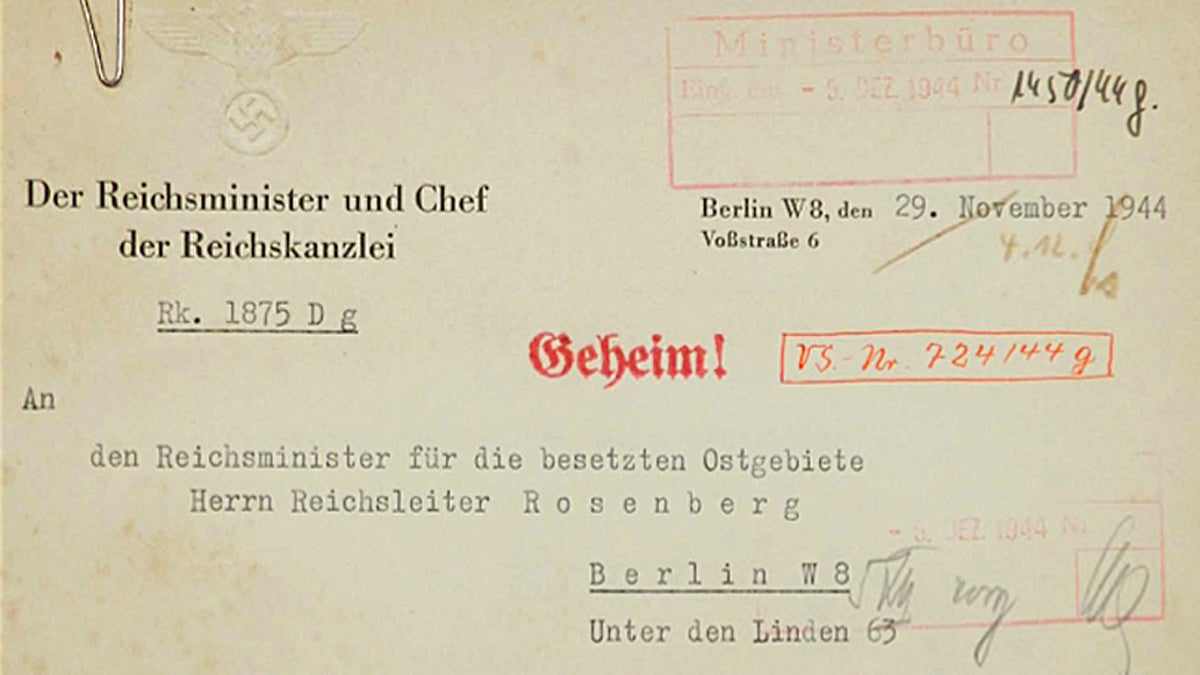Nazi criminal’s diaries could offer new insight into the Holocaust [audio]

Federal officials released this communication to Alfred Rosenberg. A translation of the 1944 document mentions "the conclusion of the Reich Commissar Ukraine’s shutting-down work." (AP Photo/U.S. District Court of the state of Delaware)
Federal authorities in Wilmington have recovered about 400 handwritten pages from the wartime diary of a key Nazi adviser to Adolf Hitler after a 17-year search for the documents, officials said Thursday.
Alfred Rosenberg played a significant role in the slaughter of millions of Jews and other non-Aryans considered inferior under the Third Reich. He was convicted of war crimes at the Nuremberg trials after World War II and executed in 1946.
Officials from the Department of Homeland Security and the Justice Department joined officials from the U.S. Holocaust Memorial Museum for a news conference Thursday to outline how they found the documents, which cover the years 1936 to 1944.
Museum officials wrote in a Web posting Thursday that the documents provide valuable information, as Rosenberg helped orchestrate the looting of artwork and other valuables from Nazi-occupied territory during that the time.
“Its discovery will undoubtedly give scholars new insight into the politics of Nazi leaders and fulfills a museum commitment to uncover evidence from perpetrators of the Holocaust,” the posting said.
Researchers have yet to begin a thorough examination of Rosenberg’s diary. But Henry Mayer, a senior adviser on archives for the Holocaust museum, suggested that it will offer some “amazing new evidence” and that he believes some of the material will contradict written history.
Among early translated excerpts is a passage from 1941 in which Rosenberg wrote proudly of a conference marking “the first time in European history that 10 European nations were represented at an anti-Jewish conference with the clear program to remove this race from Europe. …”
Later that year, Rosenberg wrote of reports that Russian leader Josef Stalin had ordered the 400,000 Volga Germans “to be dragged away to Siberia, i.e. to have them murdered. …”
“Yesterday I had a proposal drafted for communication by broadcast to Russia, England and the USA that in case this mass murder is implemented, Germany will punish the Jews of Central Europe for this.”
Other translated excerpts involve the 1936 Olympic games, including Rosenberg’s assertions that Britons were “angry about the negroes from the USA as they squeeze out the English during the Olympic Games.”
Officials said his diary was smuggled into the United States after the war, most likely by Robert M.W. Kempner, a government lawyer during the Nuremberg trials. Kempner died in 1993, and museum officials later took possession of some of his extensive document collection. But the Rosenberg diary remained missing until recently.
“One of the enduring mysteries of the Second World War is what happened to the Rosenberg diary,” said John Morton, director of U.S. Immigrations and Custom Enforcement. “We have solved that mystery.”
Mayer said the search for the diary dates to 1996, when two of Kempner’s former legal secretaries approached a Holocaust museum official about Kempner’s collection of papers.
Over the next several years, museum officials assessed and took possession of several documents from Kempner’s collection, although some material they initially viewed in 1997 at Kempner’s Pennsylvania home were missing when they went to retrieve the papers.
Mayer said officials later learned that the two secretaries and “another gentleman from upstate New York” had taken the papers.
Officials later found the materials at a home in Lewiston, N.Y., with the help of a private investigator and former FBI agent.
Acting upon a warrant issued by a federal magistrate judge in Delaware, authorities seized the diary in April. Authorities repeatedly refused to say who had the diary.
“After a bit of negotiation, shall we say, we were allowed to remove this material,” Mayer said. He offered no other details.
Rosenberg, a Nazi ideologue and propagandist, was the author of “The Myth of the Twentieth Century,” a 1930 book espousing the superiority of Aryan culture over the Jewish race.
He later led the Nazi Party’s foreign affairs department and rose through the party hierarchy to become Reich Minister for the Occupied Eastern Territories in 1941.
WHYY is your source for fact-based, in-depth journalism and information. As a nonprofit organization, we rely on financial support from readers like you. Please give today.

